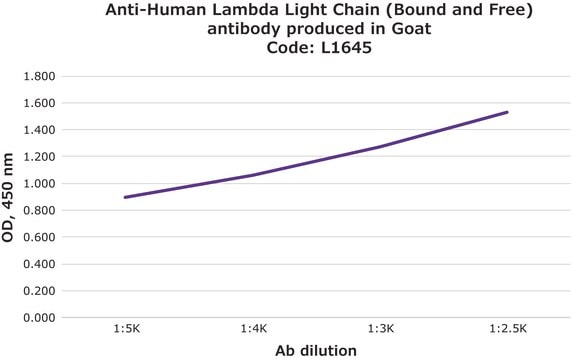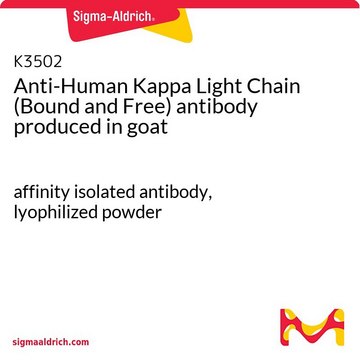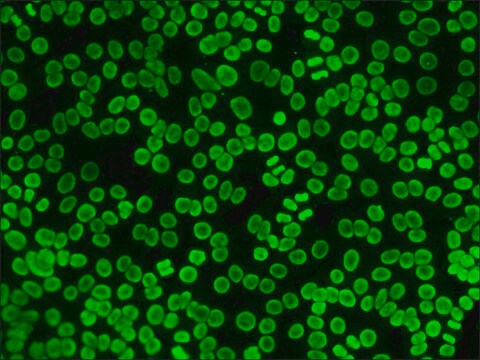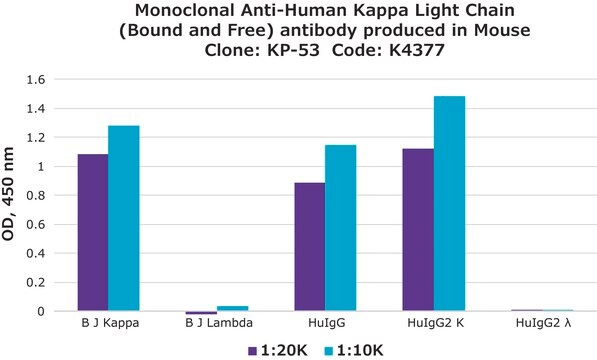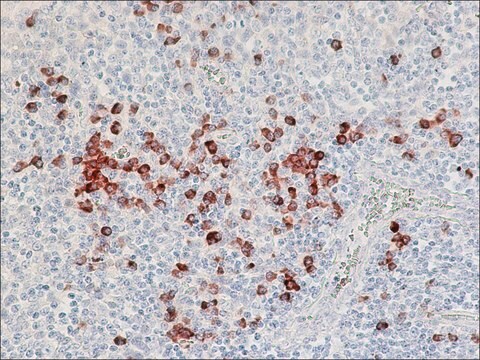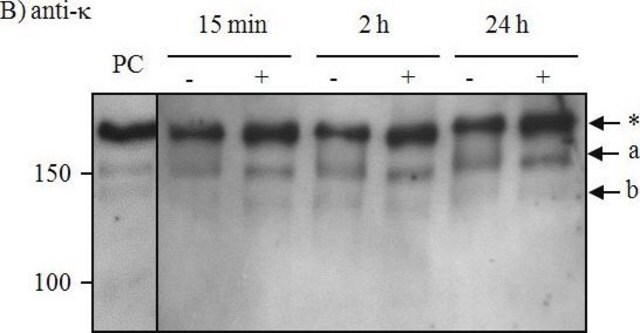Wszystkie zdjęcia(1)
Kluczowe dokumenty
F3761
Anti-Human Kappa Light Chain (Bound and Free)−FITC antibody produced in goat
affinity isolated antibody, buffered aqueous solution
Synonim(y):
Kozi anty-ludzki łańcuch lekki kappa (związany i wolny) - izotiocyjanian fluoresceiny
Zaloguj sięWyświetlanie cen organizacyjnych i kontraktowych
About This Item
Polecane produkty
pochodzenie biologiczne
goat
białko sprzężone
FITC conjugate
forma przeciwciała
affinity isolated antibody
rodzaj przeciwciała
secondary antibodies
klon
polyclonal
Formularz
buffered aqueous solution
metody
direct immunofluorescence: 1:16
temp. przechowywania
2-8°C
docelowa modyfikacja potranslacyjna
unmodified
informacje o genach
human ... IGK@(50802)
Opis ogólny
Anti-Human κ Light Chain (bound and free) antibody is obtained from goat antiserum. Immunospecific purification removes all goat serum proteins and immunoglobulins that do not bind to the κ light chain (bound and free). Goat anti-κ light chain is conjugated to fluorescein isothiocyanate (FITC). The antibody preparation is specific for human κ light (human IgA, IgG, and IgM) and free κ light chain (Bence Jones κ myeloma protein). The conjugate shows no reaction with bound or free λ light chains.
Anti-Human Kappa Light Chain (Bound and Free)−FITC antibody is specific for human kappa light chain when tested against purified bound kappa light chain (human IgA, IgG, and IgM) and free kappa light chain (Bence Jones Kappa myeloma protein). The conjugate shows no reaction with bound or free lambda light chains.
Mammalian antibodies contain one of two types of light chain, called kappa or lamba. Each chain contains a constant and a variable domain. Mammalian antibodies contain either two kappa or two lambda light chains.
Fluorescein isothiocyanate (FITC) is a fluorescein derivative (fluorochrome) used to tag antibodies, including secondary antibodies, for use in fluorescence-based assays and procedures. FITC excites at 495 nm and emits at 521 nm.
Fluorescein isothiocyanate (FITC) is a fluorescein derivative (fluorochrome) used to tag antibodies, including secondary antibodies, for use in fluorescence-based assays and procedures. FITC excites at 495 nm and emits at 521 nm.
Immunogen
Bence Jones-κ myeloma protein
Zastosowanie
Anti-Human κ Light Chain (Bound and Free)-FITC antibody may be used for immunofluorescence at a working antibody dilution of 1:16. The antibody was used in flow cytometry analysis in various studies.
Applications in which this antibody has been used successfully, and the associated peer-reviewed papers, are given below.
Flow cytometry/Cell sorting (1 paper)
Flow cytometry/Cell sorting (1 paper)
Goat polyclonal anti-Human Kappa Light Chain (Bound and Free)−FITC antibody may be used to detect and quantitate the level of kappa light chain containing antibody by fluorescent techniques.
Postać fizyczna
Solution in 0.01 M phosphate buffered saline pH 7.4, containing 1% bovine serum albumin and 15 mM sodium azide
Oświadczenie o zrzeczeniu się odpowiedzialności
Unless otherwise stated in our catalog or other company documentation accompanying the product(s), our products are intended for research use only and are not to be used for any other purpose, which includes but is not limited to, unauthorized commercial uses, in vitro diagnostic uses, ex vivo or in vivo therapeutic uses or any type of consumption or application to humans or animals.
Ta strona może zawierać tekst przetłumaczony maszynowo.
Nie możesz znaleźć właściwego produktu?
Wypróbuj nasz Narzędzie selektora produktów.
Kod klasy składowania
10 - Combustible liquids
Klasa zagrożenia wodnego (WGK)
WGK 2
Temperatura zapłonu (°F)
Not applicable
Temperatura zapłonu (°C)
Not applicable
Wybierz jedną z najnowszych wersji:
Masz już ten produkt?
Dokumenty związane z niedawno zakupionymi produktami zostały zamieszczone w Bibliotece dokumentów.
Gerhard Stadlmayr et al.
Biotechnology and bioengineering, 105(3), 543-555 (2009-10-10)
A method combining fluorescence activated cell sorting (FACS) and DNA microarray assisted clone identification was developed and termed Genome-Scale Analysis of Library Sorting (GALibSo). Genes enhancing the production of secreted heterologous proteins in Pichia pastoris were identified out of a
L F Pontes et al.
Journal of immunological methods, 251(1-2), 73-80 (2001-04-09)
Immunological rejection of kidney allografts is usually attributed to presensitization to HLA antigens. However, data on HLA identical transplant rejections indicate that non-HLA antigens may also be involved, and it has been suggested that vascular endothelium represents the main target
Annalee W Nguyen et al.
Methods in molecular biology (Clifton, N.J.), 2070, 397-422 (2019-10-19)
While antibody libraries are traditionally screened in phage, bacterial, or yeast display formats, they are produced in large scale for pharmaceutical and commercial use in mammalian cell lines. The simpler organisms used for screening have significantly different folding and glycosylation
Frederick W Jacobsen et al.
Journal of immunology (Baltimore, Md. : 1950), 186(1), 341-349 (2010-12-07)
Studies for vaccine and human therapeutic Ab development in cynomolgus monkeys (cynos) are influenced by immune responses, with Ab responses playing a significant role in efficacy and immunogenicity. Understanding the nature of cyno humoral immune responses and characterizing the predominant
Julia Hennicke et al.
New biotechnology, 50, 20-26 (2019-01-11)
IgM antibodies are arousing considerable interest as biopharmaceuticals. Despite their immunotherapeutic potential, little is known about the impact of environmental conditions on product quantity and quality of these complex molecules. Process conditions influence the critical quality attributes (CQAs) of therapeutic
Nasz zespół naukowców ma doświadczenie we wszystkich obszarach badań, w tym w naukach przyrodniczych, materiałoznawstwie, syntezie chemicznej, chromatografii, analityce i wielu innych dziedzinach.
Skontaktuj się z zespołem ds. pomocy technicznej

